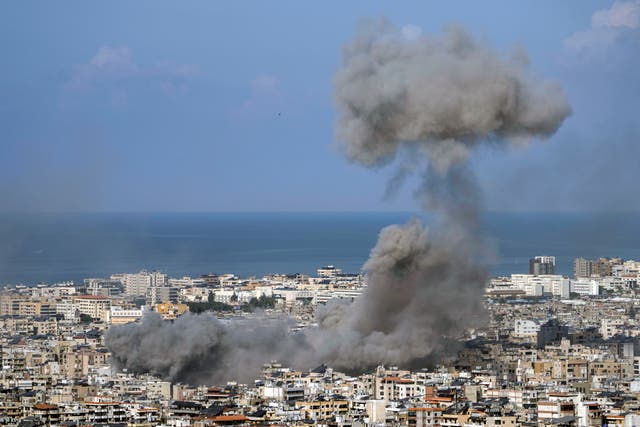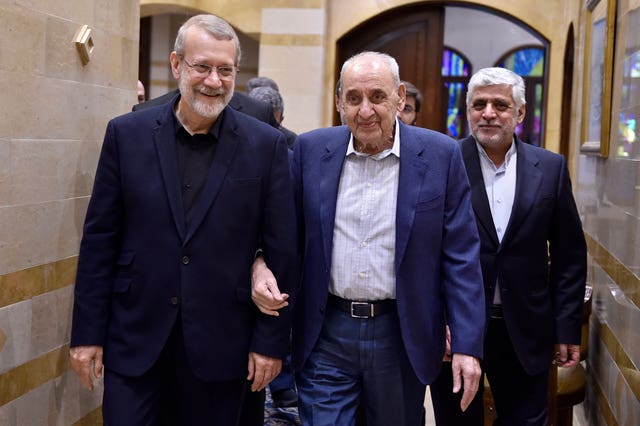
Israeli ground forces have reached their deepest point in Lebanon since they invaded six weeks ago, before pulling back after fierce battles with Hezbollah militants, Lebanese state media reported.
Israeli troops captured a strategic hill in the southern Lebanese village of Chamaa, about three miles from the Israeli border, early on Saturday, the state-run National News Agency reported. It said Israeli troops were later pushed back from the hill.
The agency added that Israeli troops blew up the Shrine of Shimon the Prophet in Chamaa as well as several homes before they withdrew, but the claim could not be verified.

Israel’s military said its troops “continue their limited, localised and targeted operational activity in southern Lebanon”.
The push on the ground came as Israeli planes pounded Beirut’s southern suburbs as well as several other areas in southern Lebanon including the port city of Tyre.
The morning strike in Beirut hit an area known as Dahiyeh, which the Israeli military called a Hezbollah stronghold, saying its planes hit multiple sites used by the militant group.
Residents were given advance warning by Israel, and it was not immediately clear whether there were any casualties.
The increase in violence came as Lebanese and Hezbollah officials study a draft proposal presented by the US earlier this week on ending the war.
Since late September, Israel has dramatically escalated its bombardment of Lebanon, vowing to cripple Hezbollah and end its barrages in Israel.
More than 3,400 people have been killed in Lebanon by Israeli fire — 80% of them in eight weeks — according to Lebanon’s Health Ministry.
On Friday, Lebanon’s caretaker prime minister apparently urged Iran to try to convince Hezbollah to agree to a ceasefire with Israel, which would require the group to pull back from the Israel-Lebanon border.
The proposal is based on UN Security Council resolution 1701, which ended the last Israel-Hezbollah war in summer 2006.
A copy of the draft proposal was handed over earlier this week by the US ambassador to Lebanon to parliament speaker Nabih Berri, who has been negotiating on behalf of Hezbollah, according to a Lebanese official, who added that Mr Berri is expected to give Lebanon’s response on Monday.
Another Lebanese politician said Hezbollah officials had received the draft, were studying it and would respond to Mr Berri.
He told the pan-Arab Asharq Al-Awsat daily newspaper that the draft does not include any item that allows Israel to act in Lebanon if the deal is violated.
“We will not accept any infringement of our sovereignty,” Mr Berri was quoted as saying.

He added that one of the items in the draft that Lebanon does not accept is the proposal to form a committee to supervise the agreement that includes members from western countries.
Mr Berri added that talks are ongoing regarding this point as well as other details in the draft, adding that “the atmosphere is positive but all relies on how things will end”.
There is also a push to end the war between Israel and Hamas, which began after Palestinian militants stormed into Israel on October 7 last year, killing about 1,200 people — mostly civilians — and abducting 250 others.
The UN Security Council’s 10 elected members on Thursday circulated a draft resolution demanding “an immediate, unconditional and permanent ceasefire” in Gaza.
The US, Israel’s closest ally, holds the key to whether the Security Council adopts the resolution. The four other permanent members — Russia, China, Britain and France — are expected to support it or abstain.
Israel’s bombardment and ground offensives since the initial Hamas attack have killed more than 43,000 people in Gaza, Palestinian health officials say. The officials don’t distinguish between civilians and combatants but say more than half of those killed have been women and children.


Why are you making commenting on The National only available to subscribers?
We know there are thousands of National readers who want to debate, argue and go back and forth in the comments section of our stories. We’ve got the most informed readers in Scotland, asking each other the big questions about the future of our country.
Unfortunately, though, these important debates are being spoiled by a vocal minority of trolls who aren’t really interested in the issues, try to derail the conversations, register under fake names, and post vile abuse.
So that’s why we’ve decided to make the ability to comment only available to our paying subscribers. That way, all the trolls who post abuse on our website will have to pay if they want to join the debate – and risk a permanent ban from the account that they subscribe with.
The conversation will go back to what it should be about – people who care passionately about the issues, but disagree constructively on what we should do about them. Let’s get that debate started!
Callum Baird, Editor of The National
Comments: Our rules
We want our comments to be a lively and valuable part of our community - a place where readers can debate and engage with the most important local issues. The ability to comment on our stories is a privilege, not a right, however, and that privilege may be withdrawn if it is abused or misused.
Please report any comments that break our rules.
Read the rules hereLast Updated:
Report this comment Cancel